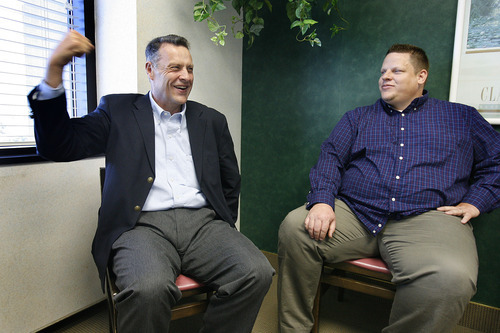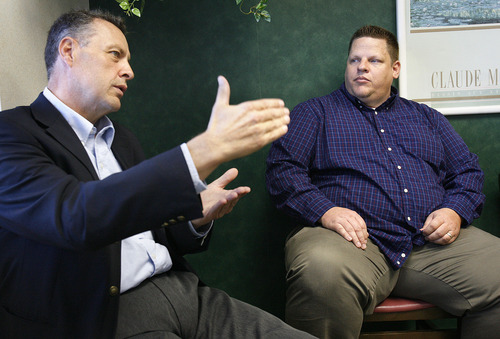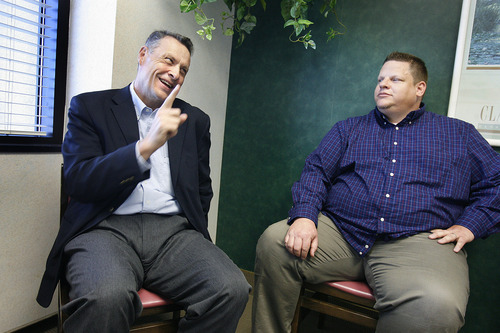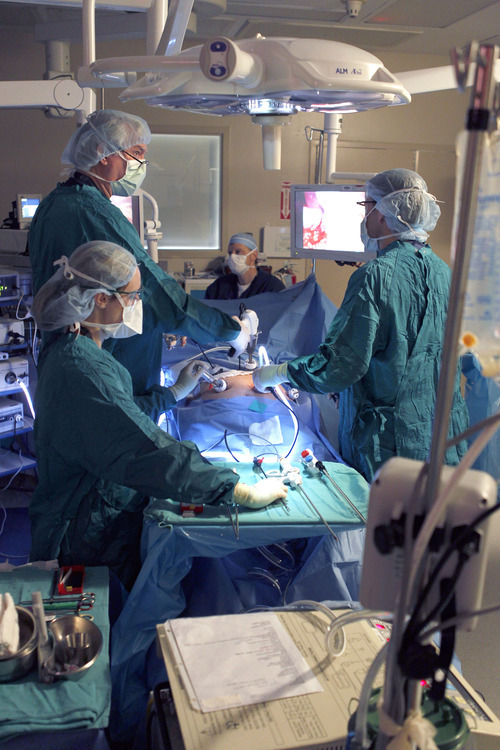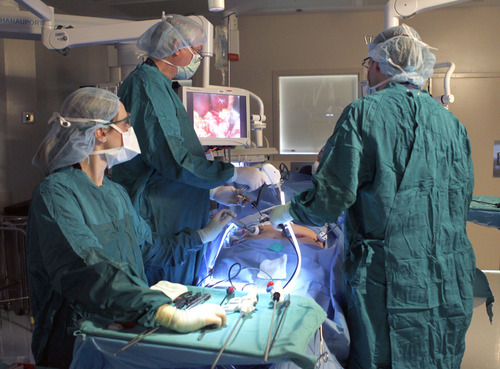This is an archived article that was published on sltrib.com in 2012, and information in the article may be outdated. It is provided only for personal research purposes and may not be reprinted.
Jeff Haaga doesn't need a study to confirm what he knows to be true.
The day before his weight loss surgery in January 2010, he weighed 409 pounds. He was pre-diabetic, had sleep apnea, painful swelling in his ankles and was taking medicines for high cholesterol and heartburn.
Since then, he's shed 190 pounds and all his health problems.
"I'm off my meds," he said. "I even got a letter from the CEO of my insurance company, SelectHealth, congratulating me for my normal blood sugar levels."
Two studies last month in the New England Journal of Medicine showed surgery can reverse Type 2 diabetes and is better at controlling the disease than conventional therapies, including medication. Prescribed for the morbidly obese for decades, weight loss surgery is now more commonly used to reverse diabetes in patients who are also overweight or obese.
Such studies, on the heels of others showing the diabetes remains reversed for several years, could encourage insurance companies to cover the surgeries sooner and not as a last resort.
"I believe insurance companies really do look carefully at the [studies]," said Ted D. Adams, lead researcher on the Utah Obesity Study, which has followed obese patients after their gastric bypass surgeries for almost 10 years.
"They're expensive procedures and insurance companies want to know, is this treatment effective? More and more insurance companies are choosing to cover bariatric surgery for the severely obese population."
There are signs that the surgery itself and not just the weight loss helps reverse diabetes.
Steven Simper, a vascular surgeon at St. Mark's Hospital who operated on Haaga, said about two-thirds of his bariatric patients are cured of their diabetes almost immediately after surgery. They leave the hospital without their diabetes medications. "The question is why?" he said.
Doctors have come to realize the surgery speeds up metabolism and promotes hormone changes that help fight diabetes, he said.
—
Preventive surgery? • Haaga, a Salt Lake City native, started gaining weight as a young adult. Despite an underactive thyroid gland, he had success with diets. "I've lost hundreds and hundreds of pounds," he says. "Like most overweight people, I'm an expert dieter."
But he always gained the weight back, and then some, until surgery.
To celebrate his weight loss, he participated in two 100-mile bike rides last year, including the Tour de Cure, which he's riding in again this year. And he joined the board of directors at the Salt Lake chapter of the Weight Loss Surgery Foundation of America, which raises money to fund bariatric surgeries.
Haaga says about half of Utah's private insurers offer plans covering bariatric surgery. Medicare, Medicaid and Utah's Public Employee Health Plan cover it, but with lots of restrictions attached.
Studies show insurers recoup the costs of weight loss surgery in two to four years as patients shed weight and associated health problems, said Simper.
Patients can regain weight years after surgery. But data from the Utah Obesity Study show 80 percent of patients remain diabetes-free two years later. Six years after surgery, the number falls to 60 percent.
Even the 40 percent who aren't cured are able to keep their blood sugar levels in control, Simper said.
Adams, a professor in the Division of Cardiovascular Genetics at the University of Utah School of Medicine, said his latest research, which is awaiting publication, shows fewer Utahns who had the surgery developed diabetes, compared with morbidly obese patients who didn't have the surgery.
"It does tend to prevent the onset of diabetes," he said.
The next question, he said, is whether the surgery should be used to treat diabetics at lower weights. Federal officials recently lowered the criteria for use of gastric bands from a body mass index of 35 down to 30 in diabetics or people with heart disease.
But Medicare covers it only for those with higher BMIs. The criteria is similar for Utahns on Medicaid.
"We need more evidence-based studies for the lower BMI to really secure recommendations," Adams said.
Data on dieting, meanwhile, even medically monitored diets, is dismal. A large study out of Sweden showed that 25 years after intensive medical therapy only 1 percent of patients were able to keep off the weight, Simper said.
"While people are skeptical, the data are overwhelming," said Simper.
—
'I got desperate' • The foundation Haaga joined chose one grant winner this year: Darren King, of Virginia, a former Utahn who returned to Salt Lake City for his surgery. One day earlier, on March 29, Haaga dropped by St. Mark's Hospital to meet King.
Haaga delivered this piece of advice: "Just because you've lost the weight doesn't mean you're perfect up here," Haaga said gesturing to his head.
Old eating habits are hard to kick and those first few weeks are a tough transition, he said. "It's almost like you're in mourning."
Leading up to the procedure, King was put on a two-week liver-shrinking diet and was briefed by a nutritionist on what to eat after surgery, and how much: proteins first, a steady supply of liquids and vitamin supplements. Later he can add vegetables.
Eating too much of the wrong things — he can't have carbohydrates until he reaches his goal weight of 250, down from 409 — will make him sick.
His stomach shrunk from 32 ounces to 2 ounces. "From a Big Gulp to a shot glass," he said.
He is motivated to do well, he said, because of the donations that paid for his surgery, a cost of $15,000 to $20,000.
"My insurance would not cover my surgery. I got desperate," said King, who has struggled with his weight since graduating from high school in 1998. His application to the Weight Loss Surgery Foundation of America said, "I have known that barring a miracle, I would be obese all of my life, and at some point it would kill me …"
He learned in late February that he had been approved.
"It's impossible to put a value on what I'm receiving. They're giving me the gift of life," he said. "They're giving my children and my wife their dad and husband back."
Hear more from Darren King
Darren King is making YouTube videos documenting his experience, talking candidly about his fears.
He records them in his car, in part because he feels uncomfortable talking about his weight in front of his family.
See the videos at:
Facebook.com/Our4kings
youtube.com/user/Bariatricboy —
Obesity in Utah
More than half, 60 percent, of Utah adults are overweight or obese
Over one in three of those Utah adults at an unhealthy weight are obese (24.0 percent Utah BRFSS* 2008).
The percentage of obese adults in Utah has more than doubled (a 128 percent increase) since 1989.
Significantly more men (67.5 percent) were overweight or obese in Utah than women (52.4 percent, Utah BRFSS 2008).
Source: Utah Department of Health
* Centers for Disease Control's Behavioral Risk Factor Surveillance System


